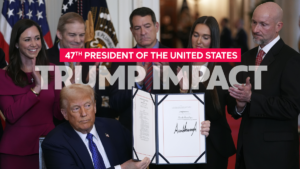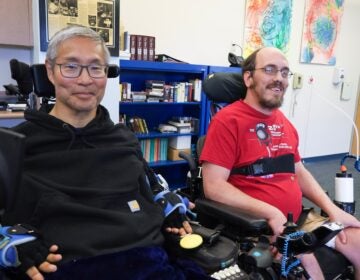For some Philly-area parents and autism advocates, Trump’s Tylenol report reveals split on research, treatment efforts
Some families say they remain frustrated at the overwhelming attention on causes of autism rather than on systems and supports to help kids today.
Listen 1:33
FILE - A parent with autism reads with her children earlier this year. Kids can be diagnosed with autism at older ages and as adults. (AP Photo/Eric Gay, File)
From Philly and the Pa. suburbs to South Jersey and Delaware, what would you like WHYY News to cover? Let us know!
When Susan Coll-Guedes was pregnant with her second child in 2011, she asked her doctor if she should drink bottled water, just in case there was something in the public water system that could possibly cause autism spectrum disorder.
“And then when the baby was born, being very scared of vaccinations,” she said. “This concern that I was going to give my child autism by vaccinating them, there had to be a lot of education from my pediatrician about that because I was so fearful.”
Autism diagnoses among children in New Jersey, where she lives, were on the rise. And Coll-Guedes already had one child with autism, who was also diagnosed with Down Syndrome at birth.
Her second-born was eventually diagnosed with 2e autism, a form of the neurodevelopmental disorder colloquially referred to as “twice exceptional,” or when a child has both intellectual giftedness and developmental or behavioral challenges.
When Coll-Guedes’ third child was diagnosed with autism, she and her husband had almost come to expect it after realizing they themselves had shown symptoms of autism spectrum disorder for decades but were never formally diagnosed.
“By the third kid, we realized it was us,” Coll-Guedes said. “We were just like, I think autistic people have autistic people.”
Getting to a place of acceptance has freed her from any guilt or shame over anything she experienced during pregnancy, she said. But the New Jersey mother and advocate knows that others are still searching for answers.
That’s why it saddens her, she said, to see divisiveness, blame and confusion in the wake of last week’s announcement by the Trump administration linking acetaminophen use during pregnancy to autism. The studies on this link have been refuted by many other autism researchers, scientists and health care providers.
The administration also announced that leucovorin has been newly approved to treat some autism symptoms despite health providers and researchers objecting to a lack of evidence on the drug’s effectiveness for these patients.
In some ways, it’s a distraction, Coll-Guedes said, from prioritizing other research being done to identify what combinations of genetic and environmental factors truly increase the risk of autism, as well as the funding needed for education programs and resources.
However, she said it’s also a moment for parents, doctors and communities to find more empathy, common ground and determination in seeking solutions that better support kids and adults with autism.
“I feel like there needs to be a certain amount of unplugging and connecting to real people,” Coll-Guedes said. “It does help to get in real-life spaces with people who have a lot of lived experience and talk to those people, too, and get the long view of what’s going on. And whenever things feel like they’re going too fast, that’s when you purposefully slow it down so that you don’t force an error that can hurt your family.”
Research into causes of autism is ongoing
About 1 in 31 children in the United States are diagnosed with autism by age 8, according to the Centers for Disease Control and Prevention. Kids can also be diagnosed at older ages and as adults.
Symptoms can be moderate or severe, including limited language skills, sensitivity to light, sound and touch, repetitive behaviors, difficulty in understanding social cues, aggressive reactions, poor motor skills and more.
Others on the spectrum may have fewer symptoms or have typical intellectual capabilities, but struggle with social skills and communication.
Scientists are discovering how varied and complex the causes of autism could be, said Kristen Lyall, associate professor at Drexel University’s A.J. Autism Institute.
“We’re talking about multiple factors, we’re talking about the really important role of genetic backgrounds and genetic risk factors, and likely interactions between genetic and environmental factors,” she said.
Lyall has studied the disorder for over a decade with a specific focus on potential risk factors during pregnancy, including exposure to air pollution, infertility treatments, maternal autoimmune disorders and more.
She’s currently investigating what role a mother’s diet during pregnancy could play in reducing or increasing the risk of a child developing autism.
Acetaminophen use during pregnancy and autism has been studied before, Lyall said, with mixed results. But the most recent large-scale study on the subject involved over 2 million children in Sweden and found no increased risk for autism.
What would be more beneficial to study, Lyall said, are the underlying reasons why a mother may need to use acetaminophen during pregnancy, and if any of those conditions, whether it be chronic headaches, infections or others, could be linked to autism.
This isn’t the first time the disorder has been in the spotlight in a controversial way, but Lyall said it’s important to continue allocating research dollars thoughtfully in specific areas.
“As long as we can continue doing really rigorous science directed in areas where we need the work, then it can be a good thing,” Lyall said.
Efforts to work with families on autism treatment
Autism can be complex to treat, especially for children with significant symptoms and co-occurring medical conditions, said scientist and psychologist David Mandell, director of the Penn Center for Mental Health at the University of Pennsylvania.
So when the Trump administration announced that the U.S. Food and Drug Administration approved a drug called leucovorin to treat autism symptoms in some kids, Mandell said it was no surprise that parents began calling their pediatricians and specialists asking about it.
However, research on the effectiveness of leucovorin, also known as folinic acid, in treating autism is limited and weak, Mandell said. There’s currently no strong evidence that it will help children with a known folate deficiency.
While the medication generally has a mild side effect profile, Mandell said it’s not without risks. Serious reactions could include gastrointestinal issues, which are already more common in autistic kids, and leucovorin could interfere poorly with anti-seizure medications.
“I am all in favor of science catching up with practice. We should do a large-scale, double-blind placebo controlled randomized trial with pre-specified outcomes, pre-specified doses of folinic acid to see if it makes a difference,” he said. “Absent of that, we do not have the data to suggest that this is a good treatment for autism.”
But in the face of parents and families with children who have already tried other kinds of therapies that haven’t worked, Mandell said that’s a tough message to sell.
“They’re saying, ‘I’ve done everything right, I’ve paid for all these things out of pocket, I’ve fought with my insurance company, I’ve taken my kids to four different appointments every week for the past two years and I’m not seeing the improvement I was told could happen. So, what do we do next?’” he said.
The recent announcement is creating friction between parents seeking the drug treatment and clinicians wary about providing it, Mandell said. But he added that maybe there’s a way for health providers to meet people halfway.
“I’m hoping they can take it in the spirit that families mean it: ‘I want to help my child,’” he said. “A lot of medicine is about harm reduction. A lot of medicine is about tradeoffs. And one possibility is you say, ‘No, this is irresponsible, it’s unethical, I’m not going to work with you if you’re going to give your child folinic acid.’ And another possibility is to say, ‘Alright, how are we going to do this together for a prescribed period of time to decide whether it’s making any difference and whether there are no negative side effects?’”
Bridging the divide in autism communities
Within hours of the White House’s announcement last week, Autism New Jersey, an advocacy and resource organization, posted several messages on social media attempting to provide clarity on the situation.
The posts referenced scientific studies that have found no causal link between acetaminophen and autism, and urged families to use caution when seeking leucovorin.
The messages drew both support and ire from the community. Some parents and families condemned the organization for casting doubt on the federal report and leaders’ announcements. Others thanked the nonprofit for upholding existing scientific findings.
“That commitment to science is our pledge to families that they can trust us,” said executive director Suzanne Buchanan.
But some families, feeling hopeful at the Trump administration’s public focus on autism, said they’ve felt angered and even betrayed at these kinds of messaging.
The New Jersey organization and its services, which include a helpline, educational training and awareness activities, is still there for those families, too, said Cassidy Grom, communications director.
“We’re not going to write them off and say, ‘Just listen to the science, here’s a blanket statement,’” she said. “We’re going to be with them every step of the way and we’re going to encourage them to talk to their doctors to understand their family system and understand what’s best for them.”
Philadelphia parent and autism advocate Jessica McMaster has seen this split of reactions play out in her community. She understands why families may want concrete answers as to how and why their child developed autism, but also feels frustrated at the lack of focus on supporting kids as they age and how systems can do that better.
“Where are the systems failing the children across the board?” she said. “Some of these kids have really interesting abilities. Why aren’t we doing more research into this? Why are we trying to pigeonhole them into regular education so early on and not catching them younger? It takes years of fighting and advocating to get the kids the necessary resources and supports in the schools.”
McMaster said her family has experienced many of these challenges with her son, who has autism, and can’t help but notice how resources for kids vary too greatly by school district, city or even state.
In New Jersey, Susan Coll-Guedes has dedicated much of her advocacy and professional research in special education to supportive programs and services for people with autism from childhood through a lifetime.
She said she looks at her three children and hopes that as they get older, there will one day be health systems better equipped to care for young adults with autism aging out of pediatric programs, more job opportunities for people with disabilities and other resources available to them designed to help them with their greatest challenges.
“And have them live a life of their own design and with dignity and not to be experimented on,” she said. “The main thing we need is research, but really it is supports in place.”

Get daily updates from WHYY News!
WHYY is your source for fact-based, in-depth journalism and information. As a nonprofit organization, we rely on financial support from readers like you. Please give today.





